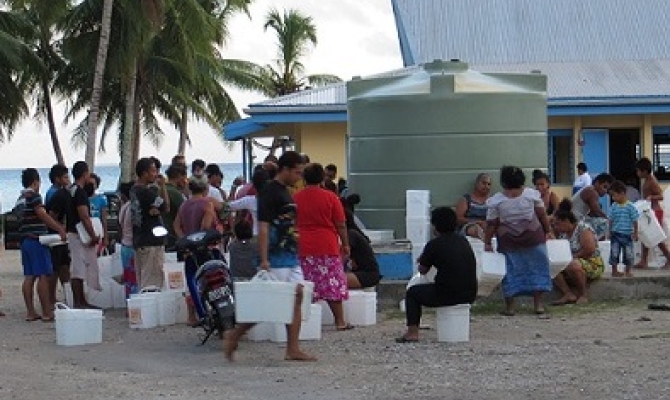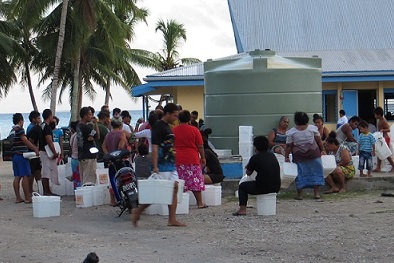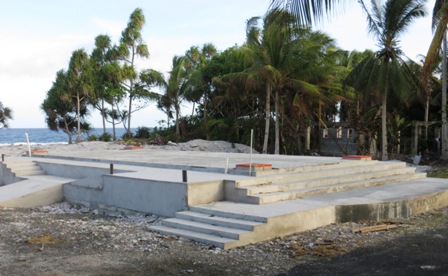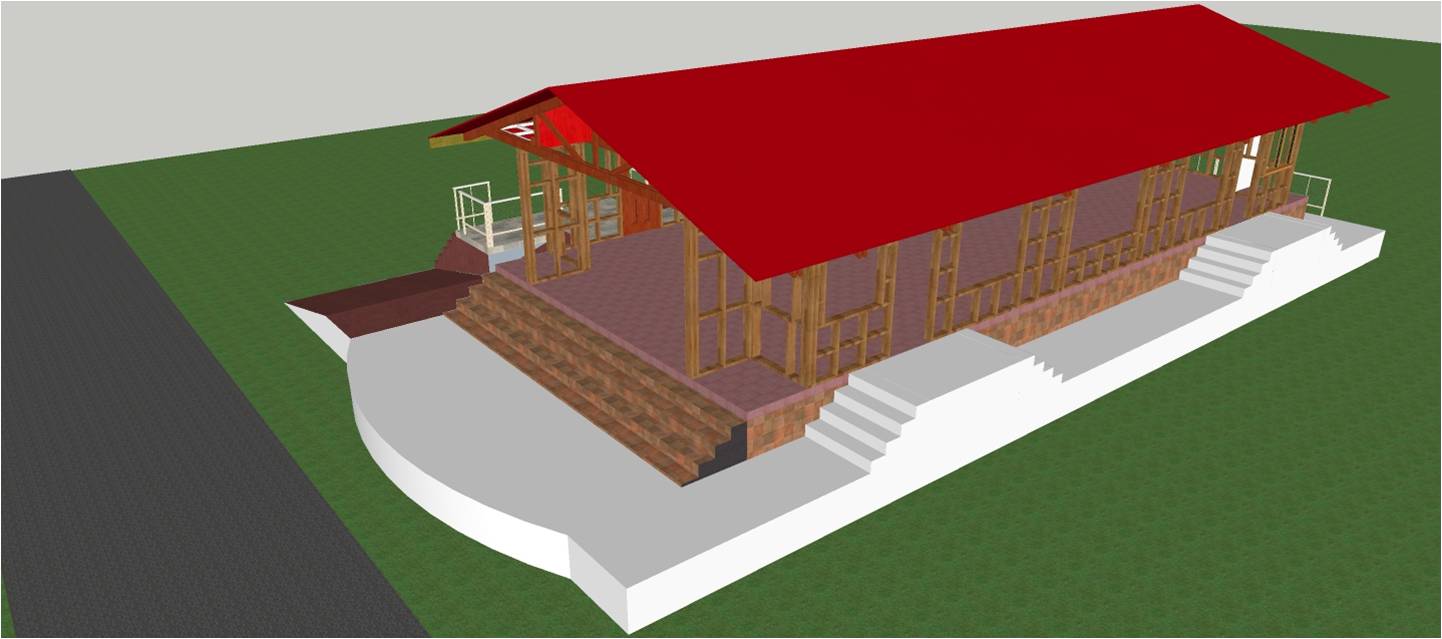
Climate Change Resilience
31 July 2014, Nadi Fiji - Last year Tuvalu opened a new 700,000 litre communal water tank in the community of Lofeagai, this year a second communal water tank that can hold 280,000 litres will be opened in the community of Tekavatoetoe.
These hold significant water capacity for the two communities in Tuvalu. The increased capacity was made available with support from the Pacific Adaptation to Climate Change Project in Tuvalu.
The Pacific Adaptation to Climate Change (PACC) Project began in 2009 and ends in December this year. PACC covers 14 Pacific island countries, including Tuvalu, helping to adapt to climate change by targeting one of the three key areas of food security and production, water resource management and coastal protection.
In Tuvalu, water shortages are common as the island is vulnerable to extreme weather events including long periods without enough precipitation.

While the average person is estimated to consume 100 litres of water per day, in Tuvalu due to the water shortages they are limited to 120 litres per household per day. In times of extreme drought events this is lowered even further to 40 litres of water per household per day which has huge health implications for the elderly, mothers and young children.
Known as a 'replication' project Tuvalu is reproducing their pilot demonstration, the communal water cistern in Lofeagai, constructed under the Pacific Adaptation to Climate Change Project through funding from the Global Environment Facility. The replication project of a water cistern in Tekavatoetoe is funded by the Government of Australia as part of PACC Plus, a continuation of the climate change adaptation project.
"This is very similar to the Lofeagai communal water cistern, however we have learnt lessons from this and are now addressing those," said Ms Taiane Apelu, the PACC Project Coordinator of Tuvalu.
"Where there have been successes, we are maintaining these such as community management of the cistern in Lofeagai, we will be doing the same with the communal cistern in Tevakatoetoe, however we're making slight additions to the water tank in Lofeagai to increase water catchment as well as add additional parts to both cisterns to make safe access to the water easier."

A Cost Benefit Analysis undertaken in Lofeagai showed it will take five and a half months of continuous rain on Tuvalu to fill their 700,000 liter water tank. Taking this into account an additional roof system to allow for a larger catchment area so more rain flows into the tank will be constructed for the water tank in Lofeagai by November this year.
These two cisterns will also have pumps installed to allow for easy access to the water from within. As it currently is in Lofeagai, individual buckets from residents are dipped into the cistern to gather water. Having a pump will provide an easier and more sanitary access to the water in Tevakatoetoe and Lofeagai.
Tevakatoetoe was selected for the 'replication project' as it was the second most vulnerable community identified during the vulnerability, after Lofeagai. Both of these communities are located at each end of the mainland the capital, Funafuti, the most farthest away from the public utilities.
The two communities have identified that limited water storage to store water when it rains contributed to water shortages when there is limited precipitation.

"This will provide better access to water for those in Tevakatoetoe at all times, not just necessarily in times of droughts, it will make a big impact on the community who fully understand the value of the role of water in the home," said Ms. Apelu.
"It's a gift that we're able to provide this to the community of Tevakatoetoe, thank you to all our partners and those that have contributed to this, we can't wait to launch it."
PACC is a multi-million dollar activity funded by the Global Environment Facility and the Government of Australia. The United Nations Development Programme (UNDP) is the implementing agency and the Secretariat of the Pacific Regional Environment Programme (SPREP) is the implementing partner, responsible for coordination and overall project management.
The Pacific Adaptation to Climate Change Project countries are Cook Islands, Fiji, Federated States of Micronesia, Marshall Islands, Nauru, Niue, Palau, Papua New Guinea, Samoa, Solomon Islands, Tonga, Tokelau, Vanuatu. The 5th Multipartite Review Meeting of the Pacific Adaptation to Climate Change Projects is held in Nadi, Fiji from 28 July to 1 August.
Photos courtesy of PACC Tuvalu
These hold significant water capacity for the two communities in Tuvalu. The increased capacity was made available with support from the Pacific Adaptation to Climate Change Project in Tuvalu.
The Pacific Adaptation to Climate Change (PACC) Project began in 2009 and ends in December this year. PACC covers 14 Pacific island countries, including Tuvalu, helping to adapt to climate change by targeting one of the three key areas of food security and production, water resource management and coastal protection.
In Tuvalu, water shortages are common as the island is vulnerable to extreme weather events including long periods without enough precipitation.

While the average person is estimated to consume 100 litres of water per day, in Tuvalu due to the water shortages they are limited to 120 litres per household per day. In times of extreme drought events this is lowered even further to 40 litres of water per household per day which has huge health implications for the elderly, mothers and young children.
Known as a 'replication' project Tuvalu is reproducing their pilot demonstration, the communal water cistern in Lofeagai, constructed under the Pacific Adaptation to Climate Change Project through funding from the Global Environment Facility. The replication project of a water cistern in Tekavatoetoe is funded by the Government of Australia as part of PACC Plus, a continuation of the climate change adaptation project.
"This is very similar to the Lofeagai communal water cistern, however we have learnt lessons from this and are now addressing those," said Ms Taiane Apelu, the PACC Project Coordinator of Tuvalu.
"Where there have been successes, we are maintaining these such as community management of the cistern in Lofeagai, we will be doing the same with the communal cistern in Tevakatoetoe, however we're making slight additions to the water tank in Lofeagai to increase water catchment as well as add additional parts to both cisterns to make safe access to the water easier."

The water cistern being constructed in Tevalatoetoe
A Cost Benefit Analysis undertaken in Lofeagai showed it will take five and a half months of continuous rain on Tuvalu to fill their 700,000 liter water tank. Taking this into account an additional roof system to allow for a larger catchment area so more rain flows into the tank will be constructed for the water tank in Lofeagai by November this year.
These two cisterns will also have pumps installed to allow for easy access to the water from within. As it currently is in Lofeagai, individual buckets from residents are dipped into the cistern to gather water. Having a pump will provide an easier and more sanitary access to the water in Tevakatoetoe and Lofeagai.
Tevakatoetoe was selected for the 'replication project' as it was the second most vulnerable community identified during the vulnerability, after Lofeagai. Both of these communities are located at each end of the mainland the capital, Funafuti, the most farthest away from the public utilities.
The two communities have identified that limited water storage to store water when it rains contributed to water shortages when there is limited precipitation.

The design of how the cistern in Tevakatoetoe will look upon completion
"This will provide better access to water for those in Tevakatoetoe at all times, not just necessarily in times of droughts, it will make a big impact on the community who fully understand the value of the role of water in the home," said Ms. Apelu.
"It's a gift that we're able to provide this to the community of Tevakatoetoe, thank you to all our partners and those that have contributed to this, we can't wait to launch it."
PACC is a multi-million dollar activity funded by the Global Environment Facility and the Government of Australia. The United Nations Development Programme (UNDP) is the implementing agency and the Secretariat of the Pacific Regional Environment Programme (SPREP) is the implementing partner, responsible for coordination and overall project management.
The Pacific Adaptation to Climate Change Project countries are Cook Islands, Fiji, Federated States of Micronesia, Marshall Islands, Nauru, Niue, Palau, Papua New Guinea, Samoa, Solomon Islands, Tonga, Tokelau, Vanuatu. The 5th Multipartite Review Meeting of the Pacific Adaptation to Climate Change Projects is held in Nadi, Fiji from 28 July to 1 August.
Photos courtesy of PACC Tuvalu